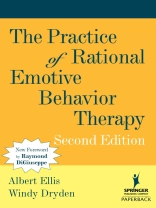Reissued with a new foreword by Raymond Di Giuseppe, Ph D, Sc D, St. John’s University
‘New trainees often get the theory of psychopathology; they struggle to get the case conceptualization and the strategic plan. Then they ask themselves. ‘What do I do now?’ Going from the abstractions to the actions is not always clear.
The Practice of Rational Emotive Behavior Therapy represents a compilation of years of theoretical and clinical insights distilled into a specific theory of disturbance and therapy and deductions for specific clinical strategies and techniques….The structure of this books focuses on an explication of the theory, a chapter on basic practice, and a chapter on an in depth case study. A detailed chapter follows on the practice of individual psychotherapy. Although the book is not broken into sections, the next four chapters represent a real treasure. The authors focus on using REBT in couples, family, group, and marathons sessions. Doing REBT with one person is difficult to learn. Once the clinician adds more people to the room with different and sometimes competing agendas things get more complicated. These chapters will not only help the novice clinician but also the experienced REBT therapists work better in these types of sessions.
So, consider yourself lucky for having picked up this book. Reading it will help many people get better.’ – From the Foreword by Raymond Di Giuseppe , Ph D, Sc D, Director of Professional Education, Albert Ellis Institute; Professor and Chair, Department of Psychology, St. John’s University
This edition, involving a unique collaboration between Albert Ellis and the world’s greatest Ellis scholar, Windy Dryden, modernizes Ellis’s pioneering theories. The book begins with an explanation of rational emotive behavior therapy as a general treatment model and then addresses different treatment modalities, including individual, couple, family, and sex therapy. The authors have added material new since the book’s original edition on teaching the principles of unconditional self-acceptance in a structured group setting. With extensive use of actual case examples to illustrate each of the different settings, and a new brand new foreword by Raymond Di Giuseppe that sets the book into its 21st-century context.
विषयसूची
‘
Foreword, by Raymond Di Giuseppe
Preface
Appendix : How to Maintain and Enhance Your Rational Emotive Behavior Therapy Gains
References
Index
‘
लेखक के बारे में
Windy Dryden, Ph D, is Professor of Counseling at Goldsmith’s College, University of London.












